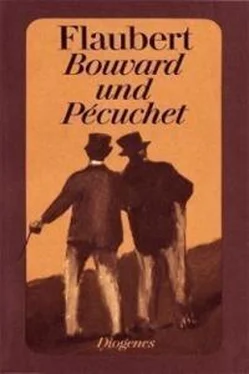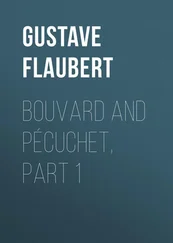In the course of the evening, as they grew calmer, they went over these occurrences, asked themselves who had drunk the Calvados, how the chest got broken, what Madame Castillon wanted when she was calling Gorju, and whether he had dishonoured Mélie.
"We are not able to tell," said Bouvard, "what is happening in our own household, and we lay claim to discover all about the hair and the love affairs of the Duke of Angoulême."
Pécuchet added: "How many questions there are in other respects important and still more difficult!"
Whence they concluded that external facts are not everything. It is necessary to complete them by means of psychology. Without imagination, history is defective.
"Let us send for some historical romances!"
Chapter V.
Romance and the Drama.
They first read Walter Scott.
It was like the surprise of a new world.
The men of the past who had for them been only phantoms or names, became living beings, kings, princes, wizards, footmen, gamekeepers, monks, gipsies, merchants, and soldiers, who deliberate, fight, travel, trade, eat and drink, sing and pray, in the armouries of castles, on the blackened benches of inns, in the winding streets of cities, under the sloping roofs of booths, in the cloisters of monasteries. Landscapes artistically arranged formed backgrounds for the narratives, like the scenery of a theatre. You follow with your eyes a horseman galloping along the strand; you breathe amid the heather the freshness of the wind; the moon shines on the lake, over which a boat is skimming; the sun glitters on the breast–plates; the rain falls over leafy huts. Without having any knowledge of the models, they thought these pictures lifelike and the illusion was complete.
And so the winter was spent.
When they had breakfasted, they would instal themselves in the little room, one at each side of the chimney–piece, and, facing each other, book in hand, they would begin to read in silence. When the day wore apace, they would go out for a walk along the road, then, having snatched a hurried dinner, they would resume their reading far into the night. In order to protect himself from the lamp, Bouvard wore blue spectacles, while Pécuchet kept the peak of his cap drawn over his forehead.
Germaine had not gone, and Gorju now and again came to dig in the garden; for they had yielded through indifference, forgetful of material things.
After Walter Scott, Alexandre Dumas diverted them after the fashion of a magic–lantern. His personages, active as apes, strong as bulls, gay as chaffinches, enter on the scene and talk abruptly, jump off roofs to the pavement, receive frightful wounds from which they recover, are believed to be dead, and yet reappear. There are trap–doors under the boards, antidotes, disguises; and all things get entangled, hurry along, and are finally unravelled without a minute for reflection. Love observes the proprieties, fanaticism is cheerful, and massacres excite a smile.
Rendered hard to please by these two masters, they could not tolerate the balderdash of the Belisaraire , the foolery of the Numa Pompilius , of Marchangy, and Vicomte d'Arlincourt. The colouring of Frédéric Soulié (like that of the book–lover Jacob) appeared to them insufficient; and M. Villemain scandalised them by showing at page 85 of his Lascaris , a Spaniard smoking a pipe—a long Arab pipe—in the middle of the fifteenth century.
Pécuchet consulted the Biographie Universelle , and undertook to revise Dumas from the point of view of science.
The author in Les Deux Dianes makes a mistake with regard to dates. The marriage of the Dauphin, Francis, took place on the 15th of October, 1548, and not on the 20th of May, 1549. How does he know (see Le Page du Duc de Savoie ) that Catherine de Medicis, after her husband's death, wished to resume the war? It is not very probable that the Duke of Anjou was crowned at night in a church, an episode which adorns La Dame de Montsoreau . La Reine Margot especially swarms with errors. The Duke of Nevers was not absent. He gave his opinion at the council before the feast of St. Bartholomew, and Henry of Navarre did not follow the procession four days after. Henry III. did not come back from Poland so quickly. Besides, how many flimsy devices! The miracle of the hawthorn, the balcony of Charles IX., the poisoned glass of Jeanne d'Albret—Pécuchet no longer had any confidence in Dumas.
He even lost all respect for Walter Scott on account of the oversights in his Quentin Durward . The murder of the Archbishop of Liège is anticipated by fifteen years. The wife of Robert de Lamarck was Jeanne d'Arschel and not Hameline de Croy. Far from being killed by a soldier, he was put to death by Maximilian; and the face of Temeraire, when his corpse was found, did not express any menace, inasmuch as the wolves had half devoured it.
None the less, Bouvard went on with Walter Scott, but ended by getting weary of the repetition of the same effects. The heroine usually lives in the country with her father, and the lover, a plundered heir, is re–established in his rights and triumphs over his rivals. There are always a mendicant philosopher, a morose nobleman, pure young girls, facetious retainers, and interminable dialogues, stupid prudishness, and an utter absence of depth.
In his dislike to bric–à–brac, Bouvard took up George Sand.
He went into raptures over the beautiful adulteresses and noble lovers, would have liked to be Jacques, Simon, Lélio, and to have lived in Venice. He uttered sighs, did not know what was the matter with him, and felt himself changed.
Pécuchet, who was working up historical literature studied plays. He swallowed two Pharamonds , three Clovises , four Charlemagnes , several Philip Augustuses , a crowd of Joan of Arcs , many Marquises de Pompadours , and some Conspiracies of Cellamare .
Nearly all of them appeared still more stupid than the romances. For there exists for the stage a conventional history which nothing can destroy. Louis XI. will not fail to kneel before the little images in his hat; Henry IV. will be constantly jovial, Mary Stuart tearful, Richelieu cruel; in short, all the characters seem taken from a single block, from love of simplicity and regard for ignorance, so that the playwright, far from elevating, lowers, and, instead of instructing, stupefies.
As Bouvard had spoken eulogistically to him about George Sand, Pécuchet proceeded to read Consuelo , Horace , and Mauprat , was beguiled by the author's vindication of the oppressed, the socialistic and republican aspect of her works, and the discussions contained in them.
According to Bouvard, however, these elements spoiled the story, and he asked for love–tales at the circulating library.
They read aloud, one after the other, La Nouvelle Héloïse , Delphine , Adolphe , and Ourika . But the listener's yawns proved contagious, for the book slipped out of the reader's hand to the floor.
They found fault with the last–mentioned works for making no reference to the environment, the period, the costume of the various personages. The heart alone is the theme—nothing but sentiment! as if there were nothing else in the world.
They next went in for novels of the humorous order, such as the Voyage autour de ma Chambre , by Xavier de Maistre, and Sous les Tilleuls , by Alphonse Karr. In books of this description the author must interrupt the narrative in order to talk about his dog, his slippers, or his mistress.
A style so free from formality charmed them at first, then appeared stupid to them, for the author effaces his work while displaying in it his personal surroundings.
Читать дальше








![Гюстав Флобер - Закат Карфагена [Сборник]](/books/414440/gyustav-flober-zakat-karfagena-sbornik-thumb.webp)


